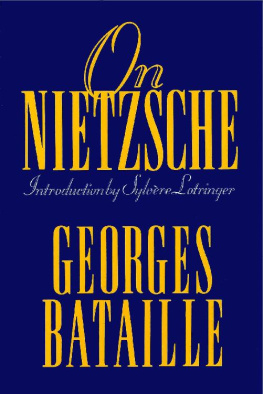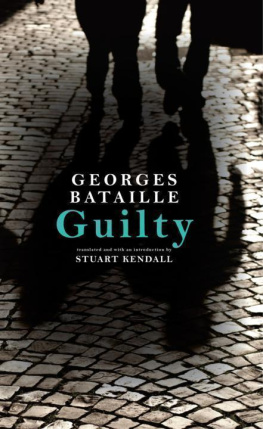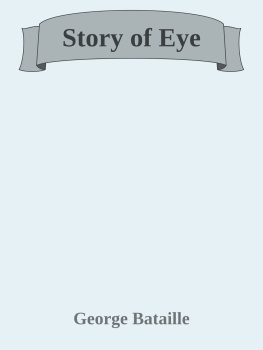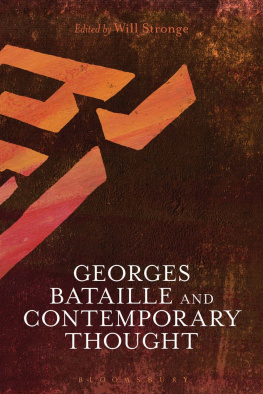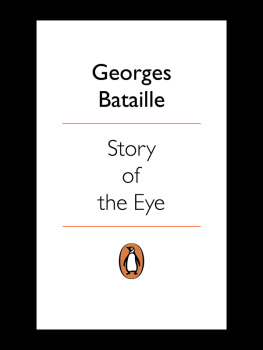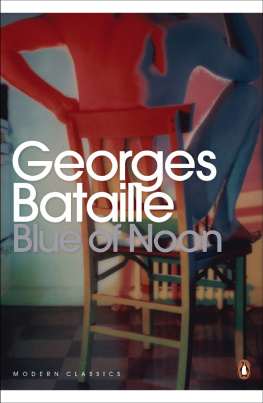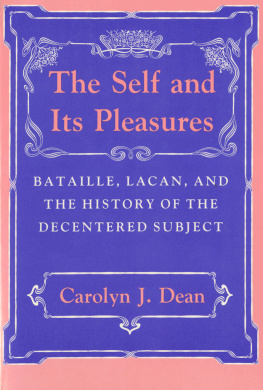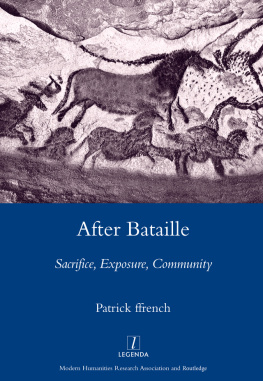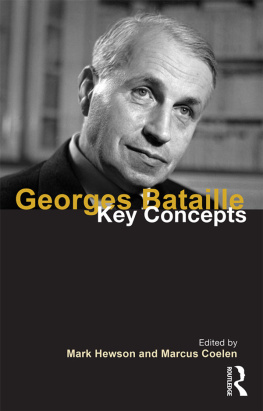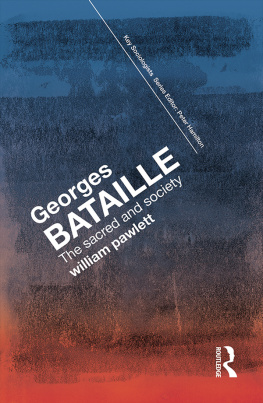Georges Bataille - On Nietzsche
Here you can read online Georges Bataille - On Nietzsche full text of the book (entire story) in english for free. Download pdf and epub, get meaning, cover and reviews about this ebook. year: 2012, publisher: Paragon House, genre: Religion. Description of the work, (preface) as well as reviews are available. Best literature library LitArk.com created for fans of good reading and offers a wide selection of genres:
Romance novel
Science fiction
Adventure
Detective
Science
History
Home and family
Prose
Art
Politics
Computer
Non-fiction
Religion
Business
Children
Humor
Choose a favorite category and find really read worthwhile books. Enjoy immersion in the world of imagination, feel the emotions of the characters or learn something new for yourself, make an fascinating discovery.
- Book:On Nietzsche
- Author:
- Publisher:Paragon House
- Genre:
- Year:2012
- Rating:4 / 5
- Favourites:Add to favourites
- Your mark:
- 80
- 1
- 2
- 3
- 4
- 5
On Nietzsche: summary, description and annotation
We offer to read an annotation, description, summary or preface (depends on what the author of the book "On Nietzsche" wrote himself). If you haven't found the necessary information about the book — write in the comments, we will try to find it.
On Nietzsche — read online for free the complete book (whole text) full work
Below is the text of the book, divided by pages. System saving the place of the last page read, allows you to conveniently read the book "On Nietzsche" online for free, without having to search again every time where you left off. Put a bookmark, and you can go to the page where you finished reading at any time.
Font size:
Interval:
Bookmark:

On
Nietzsche
by
GEORGES BATAILLE
Translated by Bruce Boone
Introduction by Sylvre Lotringer

PARAGON HOUSE
Saint Paul
First e-book edition, 2012
First paperback edition, 1994
First American edition, 1992
Published in the United States by
Paragon House
1925 Oakcrest Avenue
St. Paul, MN 55113
All rights reserved. No part of this book may be
reproduced, in any form, without written permission
from the publishers, unless by a reviewer who wishes
to quote brief passages.
Originally published in French under the title Sur Nietzsche .
Copyright Editions Gallimard 1945
English translation copyright 1992 Paragon House
Manufactured in the United States of America
Library of Congress Cataloging-in-Publication Data
E-book ISBN: 978-1-61083-071-3
Bataille, Georges, 1897-1962.
[Sur Nietzsche. English]
On Nietzsche / by Georges Bataille ; translated by Bruce Boone ;
introduction by Sylvre Lotringer.1st American ed.
p. cm.
Translation of: Sur Nietzsche.
ISBN 1-55778-644-5 (pbk)
ISBN 1-55778-325-X (HC)
1. Nietzsche, Friedrich Wilhelm, 1844-1900. I. Title.
B3317.B41513 1992
193dc20 91-26664
CIP
This edition is published with the help of the French Ministry of Culture.
FURIOUSLY NIETZSCHEAN
An Introduction by Sylvre Lotringer
GEORGES BATAILLE wasnt a regular philosopher like Hegel or Sartre. He was diffident of concepts, resilient to systems and deeply suspicious of language. Bataille never developed ideas that he didnt back up with his life. One shouldnt expect, therefore, On Nietzsche to be a traditional commentary. It is, rather, an attempt by Bataille to circumscribe what he recognized in Nietzsche as his own.
Nietzsche was a major influence in Batailles life. In 1915 Bataille converted to Catholicism after leaving his father, blind and syphilitic, in the hands of the Germans. It is Nietzsche who rescued him, at age twenty-three, from this crisis, turning him as passionately against religion. All through the years that preceded World War II, Bataille was among the very few who tried to clear Nietzsche from the stain of National Socialism. In various issues of Acephale, he proved, text in hand, that Nietzsche was the least patriotic] of all Germans, and the least German of the Germans, a sovereign thinker especially hostile to pan-German anti-Semitism, this shameless humbug of races.
Reclaiming Nietzsche from the Nazis was also a way of validating his own fascination for violence and fanaticism, a fundamental aspiration of humanity, he said, that the fascists misappropriated. In the Spring of 1939, while everyone was praying for peace, Bataille could be found hailing the war as something ordinary life lackedsomething that causes fear and prompts horror and anguish, like falling off a rooftop, or a volcano erupting.
Alas, war proved a disappointment. Beset by tuberculosis, Bataille was forced to take a leave from his job as a librarian and spend most of the wartime in the country. Never had he been more isolatedmore disoccupiedthan during the German occupation.
Bataille found the war boring.
For Bataille, however, being bored was just a way of being. Only anguishextreme anguishcould violate the limits of being and bring intensity back into his life. This is what Bataille trained himself to experience on his own, methodically, suffocating himself into a trance with images of torture and dismemberment. These spells of deep anguish and somber incandescence were haltingly chronicled in his wartime writings.
The period between 1941 and 1944 was, paradoxically, one of the most prolific in Batailles lifetime. After Madame Edwarda, a story of intense erotic mysticism, he wrote, and published, Inner Experience, Guilty, and On Nietzsche, all blinding statements made of fragments and aphorisms, journal entries, quotes and feverish notes. For a while Bataille envisaged including these three volumes in a magnum opus,
The Atheological Summa, an ambitious project, which was never completed. Now that he was released from the political fervor of the pre-
war years, he had come to view any effort (any action) as a symptom of decline, a betrayal of the summit. His thoughts only thrived in the passing instant. No wonder they didnt hold togetherany more than Nietzsches own aphorisms.
Except for (a few) exceptions, Bataille wrote, my company on earth is mostly Nietzsche... Not an easy thing to do, keeping
Nietzsche company. Few would take up the challengeor deserve the try. Intimacy with great thinking is unbearable, Nietzsche warned. I seek and make appeal to whom I can communicate such thinking without bringing about their deaths.
Disciples are too weak not to die when confronted with an excessive experience. Bataille was ready to die, but without dying from it. Dying and coming back was what Bataille thought communication is about. A ritual sacrifice where the crime is shared; outer violence turned inward, destroying the limits of being. Sacrificing discourse for a more intense form of communication was something Nietzsche seemed to have been able to do effortlessly. Bataille was less fortunate: The neurotic has only a single way out AND MUST RISK HIMSELF. Batailles own disorderly method was a deliberate gamble with madness: a will to chance....
Bataille started his essay on a startling admission: Motivating this writingas I see itis fear of going crazy.
On Nietzsche: a tale of u nsatisfied desire?
As could be expected, Bataille quoted Nietzsche extensivelyalthough not to the point of disappearing entirely behind his mentors text, as happens in Memorandum, a collage of Nietzsches later writings Bataille also published in 1944, to celebrate the centenary of Nietzsches birth. Yet Nietzsches Genealogy of Morals is hardly present anywhere, a curious oversight considering that On Nietzsche set itself as a goal to pose and resolve intimate problems of morality.
Was that something deliberate on Batailles part?
In his Genealogy, Nietzsche probed the origin of moral ideas, questioning . the worth of the notions of good and evil in our sinister European civilization. Bataille, apparently, followed suit. Right from the start, he warned the reader that he intended to show the opposition between good and evil under another light. Yes, but which light? Nietzsches light? Nietzsche never treated morality as an intimate problem; nor did he put much faith in mans interior world, the breeding ground for that terrible sickness: bad conscience. Nietzsches main concern wasnt with mans soul, but with the disastrous effect it may have on the human species as a whole, preventing it from reaching the peak of magnificence of which he is capable. Would Nietzsche, in any case, have examined the question of ethics, not in terms of action but, as Bataille did, in reference to beingor beings? In the first essay of the Genealogy, Nietzsche dismissed in advance those changelings called subjects as mere linguistic fallacy. There is no being, he wrote, behind the doing, acting, becoming... the doing is everything. (Genealogy of Morals, New York: Anchor Books, 1956, p. 179)
Its under an entirely different light, therefore, that Bataille explored the question of moralitythe light of inner experience. And yet Bataille didnt consider that radical shift a betrayal. Nietzsche, he said, expressed an extreme, unconditional human yearning... independently of moral goals or of serving God, but he couldnt always maintain himself at this summit. Although indifferent to all political stakes, he couldnt always reach beyond the stage of action which necessarily suppresses our being as entirety. Bataille, in short, offered to supplement Nietzsches occasional failings by drawing out within himself the consequences of Nietzsches doctrine.
Next pageFont size:
Interval:
Bookmark:
Similar books «On Nietzsche»
Look at similar books to On Nietzsche. We have selected literature similar in name and meaning in the hope of providing readers with more options to find new, interesting, not yet read works.
Discussion, reviews of the book On Nietzsche and just readers' own opinions. Leave your comments, write what you think about the work, its meaning or the main characters. Specify what exactly you liked and what you didn't like, and why you think so.

